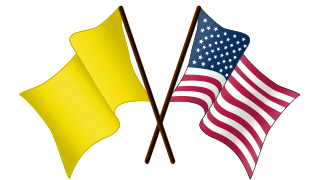
The Libertarian Party (LP) is a neoclassical liberal political party in the United States that promotes civil liberties, non-interventionism, laissez-faire capitalism, and limiting the size and scope of government. The party was conceived in August 1971 at meetings in the home of David F. Nolan in Westminster, Colorado, and was officially formed on December 11, 1971, in Colorado Springs. The organizers of the party drew inspiration from the works and ideas of the prominent Austrian school economist Murray Rothbard. The founding of the party was prompted in part due to concerns about the Nixon administration, the Vietnam War, conscription, and the introduction of fiat money.
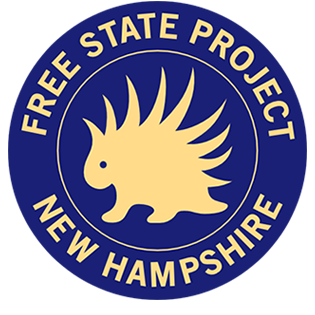
The Free State Project (FSP) is an American political migration movement founded in 2001 to recruit at least 20,000 libertarians to move to a single low-population state in order to make the state a stronghold for libertarian ideas. The New Hampshire Union Leader reports that the Free State Project is not a political party but a nonprofit organization.

The Freedom Socialist Party (FSP) is a trotskyist and socialist feminist political party in the United States. FSP formed in 1966, when its members split from the Socialist Workers Party.
The Free West Alliance (FWA) was an organization attempting to organize the migration of libertarians and the like-minded into the U.S. states of Idaho, Montana and Wyoming, in order to influence local political policy toward libertarian ideals. It also sought to mobilize residents of the states who had libertarian politics.

The Volokh Conspiracy is a legal blog co-founded in 2002 by law professor Eugene Volokh, covering legal and political issues from an ideological orientation it describes as "generally libertarian, conservative, centrist, or some mixture of these." It is one of the most widely read and cited legal blogs in the United States. The blog is written by legal scholars and provides discussion on complex court decisions.

The Libertarian Party of New York (LPNY), is the affiliate of the Libertarian Party in the U.S. state of New York. Due to changes in New York State election law in 2020, the Libertarian Party lost its ballot status. It is the recognized affiliate of the national Libertarian Party.
The Tiebout model, also known as Tiebout sorting, Tiebout migration, or Tiebout hypothesis, is a positive political theory model first described by economist Charles Tiebout in his article "A Pure Theory of Local Expenditures" (1956). The essence of the model is that there is in fact a non-political solution to the free rider problem in local governance. Specifically, competition across local jurisdictions places competitive pressures on the provision of local public goods such that these local governments are able to provide the optimal level of public goods.
Charles Mills Tiebout (1924–1968) was an economist and geographer most known for his development of the Tiebout model, which suggested that there were actually non-political solutions to the free rider problem in local governance. He earned recognition in the area of local government and fiscal federalism with his widely cited paper “A pure theory of local expenditures”. He graduated from Wesleyan University in 1950, and received a PhD in economics in University of Michigan in 1957. He was Professor of Economics and Geography at the University of Washington. He died suddenly on January 16, 1968, at age 43.

The Libertarian Party of New Hampshire (LPNH) is the New Hampshire affiliate of the national Libertarian Party (LP). Active since its foundation in 1972, it is the third-largest political party in the state having had multiple members elected to the New Hampshire House of Representatives as well as being ballot-qualified multiple times.
New Hampshire is often noted for its moderate politics and its status as a prominent swing state. Voters predominantly selected Republicans for national office during the 19th and 20th centuries until 1992. Since then, the state has been considered a swing state. Since 2006, control of the state legislature and New Hampshire's congressional seats have switched back and forth between Republicans and Democrats. Although the state has voted for the Democratic candidate in the last six presidential elections since 2004, it has done so by relatively small, however consistent margins.
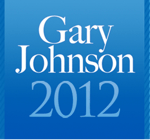
The 2012 presidential campaign of Gary Johnson, the 29th governor of New Mexico, was announced on April 21, 2011. He declared his candidacy for the 2012 Republican Party nomination for President of the United States. On December 28, 2011, Johnson withdrew his candidacy for the Republican nomination, and declared his candidacy for the 2012 presidential nomination of the Libertarian Party. The 2012 Libertarian National Convention was held during the first weekend of May 2012. On May 5, 2012, after promoting his libertarian-oriented political positions to delegates, Johnson received the most votes at the convention and became the official 2012 Libertarian presidential nominee. On November 6, 2012, Johnson received just under 1% of the popular vote in the general election, amounting to more than 1.2 million votes, more than double what the Barr/Root ticket received in 2008. This was the most successful result for a third-party presidential candidacy since 2000, and the best in the Libertarian Party's history by vote number at the time. Johnson ran again in 2016 and received nearly four times his 2012 vote total.
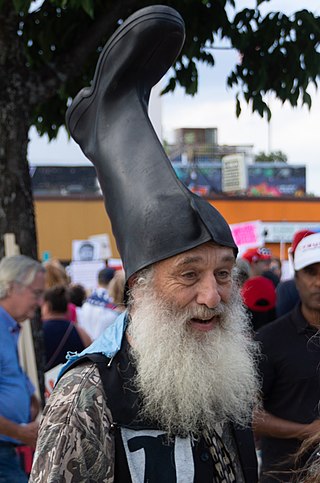
Vermin Love Supreme is an American performance artist and activist who has run as a novelty candidate in various local, state, and national elections in the United States. He served as a member of the Libertarian Party's judicial committee. Supreme is known for wearing a boot as a hat and carrying a comically large toothbrush, and has said that if elected President of the United States, he will pass a law requiring people to brush their teeth. He has campaigned on a platform of zombie apocalypse awareness and time travel research, and promised a free pony for every American.
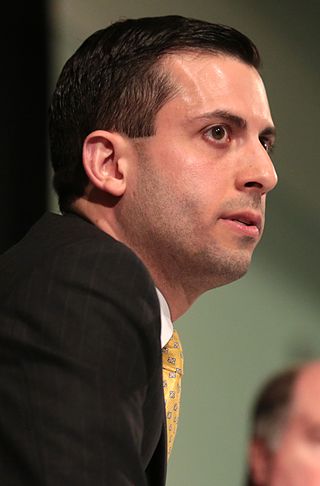
Alexander Nowrasteh is an American analyst of immigration policy currently working at the Cato Institute, a libertarian think tank located in Washington D.C. Nowrasteh is an advocate of freer migration to the United States. He previously worked as the immigration policy analyst at the Competitive Enterprise Institute, another libertarian think tank. Nowrasteh is a self-described "radical" advocate for open borders to and from the United States. He has published a number of peer-reviewed studies on immigration and co-authored with Benjamin Powell the book Wretched Refuse?: The Political Economy of Immigration and Institutions.
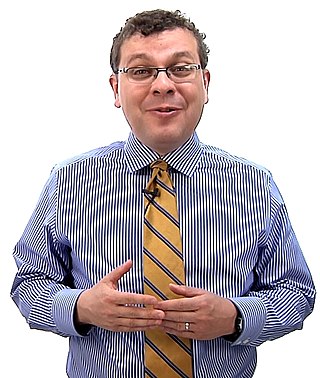
Ilya Somin is a law professor at George Mason University, B. Kenneth Simon Chair in Constitutional Studies at the Cato Institute, a blogger for the Volokh Conspiracy, and a former co-editor of the Supreme Court Economic Review (2006–2013). His research focuses on constitutional law, property law, migration rights, and the study of popular political participation and its implications for constitutional democracy.

Democracy and Political Ignorance: Why Smaller Government Is Smarter is a 2013 book from Stanford University Press by George Mason University law professor Ilya Somin. Somin argues that people are ignorant and irrational about politics and that this creates problems for democracy. He further claims that this consideration argues in favor of smaller and more decentralized government.

Eric Brakey is the current Executive Director of the Free State Project, and an American politician, who served as a Maine state senator from 2014 to 2018, and again from 2022 to 2024.

Nicholas Joel Sarwark is an American attorney and businessman who served as the 19th chair of the Libertarian National Committee (LNC), the governing body of the Libertarian Party. Prior to his election in 2014, he served on several LP national committees and as chair of the Libertarian Party of Maryland State Committee and vice chair of the Libertarian Party of Colorado State Committee. As of 2020, he is the only LP chair to have served three consecutive terms.

Jason Sorens is an American political scientist and a conservative libertarian activist. He founded the Free State Project in 2001.

Carla Gericke is an author, activist, and attorney. Born in South Africa, she immigrated to the United States in the 1990s after winning a green card in the Diversity Visa Lottery. She became a U.S. citizen in 2000. Gericke practiced law in South Africa, and California, working at Apple Computer, Borland, Logitech, and Scient Corporation. Gericke is President Emeritus of the Free State Project. In 2014, she won a landmark First Circuit Court of Appeals case that affirmed the First Amendment right to film police officers. That same year, she was named one of New Hampshire Magazine's "2014 Remarkable Women" In 2016, Gericke ran as a Republican for New Hampshire State Senate in District 20 against Democrat Lou D'Allesandro, garnering 40% of the vote in the general election. In 2018, after a successful recount on a write-in campaign on the Libertarian Party's ballot, she ran as a fusion Republican/Libertarian candidate and received 42% of the vote, up two percentage points in a year when District 20 swung 12–15% left due to the "Blue Wave." In 2020, Gericke ran again against D'Allesandro in District 20 and again lost, this time by a vote tally of 13,548 to 10,479, or approximately 56–44%.

Jeremy Kauffman is an American entrepreneur and political activist known for founding and leading the blockchain-based filesharing project LBRY. Kauffman is also known as a vocal supporter and activist within the Free State Project (FSP) and a former board member. The FSP is a movement designed to get libertarians to move to the state of New Hampshire. Kauffman was the Libertarian nominee in the 2022 United States Senate election in New Hampshire, losing to Democrat Maggie Hassan.















